Peace

The letter arrived at work about two weeks after baseball’s opening day in 2003. It had a Zanesville, Ohio, postmark. A return address sticker mentioned a Mrs. Howard Richardson.
What‘s this about?
Inside was a handwritten note along with a neatly clipped copy of my Cincinnati Reds season preview story from the Zanesville Times Recorder. I didn’t have to read far to get the gist.
This Mrs. Howard Richardson — she wasn’t happy with me. Not at all.
In beautiful cursive — the kind of handwriting you don’t see anymore — she pointedly took me to task for suggesting the Reds could be awful that season. I should be more positive, she insisted. It would help the players.
“You get more flies with honey than vinegar!!!!!” she wrote. (Yes, underlined and topped off with many exclamation points.)
The note was signed: Evelyn Richardson.
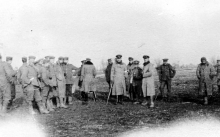
One hundred years ago, during the First World War, the Christmas truce took place between British, German, and French soldiers in the trenches on the Western Front. On Christmas Eve 1914, soldiers from opposing sides, who were stationed there to kill each other, instead got to know one another, shared photos of loved ones, and even had a game of soccer.
This of course made their superiors furious, not just because the troops were disobeying orders, but because it is much harder to harm someone with whom you have formed some sort of relationship. The enemy is to be faceless and nameless.
The same holds true for millions of people living in poverty around the world this Christmas. They are the faceless and nameless ones. In reality though, the enemy that is poverty is not faceless. Poverty is about people; it is not about statistics. Poverty is also not just about a lack of material goods; it is more about a lack of dignity, a lack of a sense that you are important. We are reminded that poverty is always personal because it is about relationship.

I'm grateful for the warm, safe shelter of my home when there are 610,042 experiencing homelessness on any given night in the U.S.
I’m grateful for more than enough to eat when there are 805 million people in the world do not have enough food to lead a healthy active live.
I’m grateful that I have clean drinking water when over 3.4 million people die each year from water, sanitation, and hygiene-related causes.
I’m grateful that I have good health when so many people do not have access to decent medical care, like the 5,459 people who have died from Ebola this year, and the millions more who die each year from preventable diseases.
I’m grateful I have clothing to wear when in the poorest of places, the lack of proper clothing costs lives, and hundreds of millions still live in conditions of material deprivation.
I’m grateful for my freedom when the U.S. had 1.57 million inmates behind bars, the highest percentage of a population of any developed country in the world.
I’m grateful for my citizenship when there are over 11 undocumented immigrants in the U.S. living in the shadow of constant fear.
But I’m especially grateful for the people I know, and the ones I don’t, that are working for justice and peace; a world where all our brothers and sisters have the basic necessities of shelter, food, clean water, decent medical care, and warm clothing. A world where every human being’s dignity is respected and valued. A world Jesus called the Kingdom of Heaven.

I currently serve as Pastoral Associate at a Catholic parish in Buffalo, NY, where our pastor decided to hold monthly Prayer Hours for Peace in response to the violent outbreaks in Syria, the uprising in Ferguson over Michael Brown’s death, ISIS, gang violence — to name a few.
Our November Prayer Hour for Peace offered four rounds of Scripture passages and ten-minute reflection and prayer time, followed with an excerpt from a Pax Christi USA prayer called “Just for Today.”
I read this excerpt aloud:
“Just for today, I will believe that world peace is possible. I will remember that hope is the most important gift I can give my world.”
The next Scripture verse was from Psalm 122:6-8.
“Pray for the peace of Jerusalem: May those who love you be secure. May there be peace within your walls and security within your citadels. For the sake of my family and friends, I will say, Peace be within you.”
For the next ten minutes, I inhaled “belief….possible” and exhaled “hope most important gift.” Physically, my body relaxed, and I watched my hope flow out into my immediate surroundings.
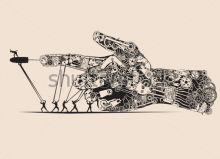
Peace, with its connotation of tranquility and stillness, is the Christian’s most misunderstood concept. We have long sought to keep peace by silencing dissent under the guise of pursuing unity, coated with a zealous concern for niceties, unwilling to budge a status quo. We forget to ask the crucial question: for whom do we keep peace?
Wherever peace is elusive, the first ones to suffer are the vulnerable.
When corporations engage in legal battles, employees who don’t get a vote have the most at stake. When marital tensions rise high, children’s tender spirits lay at the parents’ mercy. When war ravages a country, the displaced peoples helplessly suffer.
When keeping the peace only benefits the powerful, it is not a Christian peace. The sweet baby Jesus portrayed in sentimental Christmas cards has taken an abrupt departure from the kind of peace we see Jesus embody in Scripture. Even as an infant, the baby Jesus so disrupted the power authorities of the day that sent them scrambling into every home killing firstborn baby boys.
Christian peace is not about coddling people’s fear of conflict. It isn’t about making sure everyone is comfortable. It does not silence those for whom a lack of peace is a life or death situation. The irony is that often, the ones with feeble power are the ones who are told to keep peace and remain silent.
When the society is disrupted by scandalizing conflict — whether it is the Bill Cosby rape accusations, or the “harsh disciplinary methods” of certain celebrity parents, or an entire neighborhood weary of losing their young men to police violence — the Christian dare not keep peace by silencing the voice of the victims.


I believe in love. I don’t subscribe to any particular religion.
Feroz, a Hazara who is a Shia Muslim, lived with me in a community in Kabul with 13 other Afghan Peace Volunteers, including Tajiks and Pashtuns, who are Sunnis.
This is a community established with the intention of learning about and practicing nonviolence, a little like an Afghan version of Gandhi’s ashram.
One day, there were black faces and a curt exchange of words.
“What meaning does praying with the little piece of stone have anyway?” Bashir, a Tajik, who is a Sunni Muslim, snapped at Feroz, a Hazara, who is a Shia Muslim.
“Why should that bother you? It’s important to us. Your way of praying isn’t particularly good either, praying with your hands ‘closed,’” Feroz retorted. Shia Muslims like Feroz pray with their hands and arms in an ‘open’ posture, and till today, some Shia and Sunni religious leaders make an issue of it.
The ways we reach out to God should be happy endeavors, but these ways can become bones of contention, especially if they’re deemed to be special or exclusive paths to God.
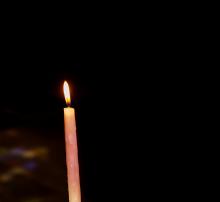
In the wake of the latest escalation of the U.S. “war on terror,” it’s time to remember the origin of Veterans Day. In 1926, Congress officially recognized the commemoration of Armistice Day on Nov. 11 with the exhortation, “the recurring anniversary of this date should be commemorated with thanksgiving and prayer and exercises designed to perpetuate peace through good will and mutual understanding between nations.” Armistice Day commemorated the day when World War I hostilities ceased, and had been celebrated informally since 1919 as a day to work for peace.
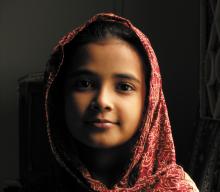
LAST YEAR, as I was unpacking my son’s school backpack, I found the children’s book on the Prophet Muhammad that my wife and I read to him at night. He had brought it to school without telling us. “It was for show and tell,” he explained to me.
You might think that my first reaction would be happiness. One of my goals as a Muslim parent is to help my kids feel connected to their faith. Clearly my son felt close enough to his religion to bring a book on the Prophet to share with his class.
What I actually felt was a shock of fear shoot down my spine. It was an immediate, visceral reaction. A whole slew of questions raced through my head. What did his teacher think of Muslims? What about his classmates? Would somebody say something ugly or bigoted about Islam during my son’s presentation? Would his first taste of Islamophobia come at the age of 5 during show-and-tell?
My fear at that moment is one small window into what it feels like to be a Muslim-American parent at a time when Muslim extremism is on prominent display and Islamophobia in America continues to spread.

WHEN JOHANNES BRAHMS first played his German Requiem in Vienna in 1867, the audience was shocked. In fact, scholars report that some “hissed and booed and behaved quite boorishly.”
This October, when the St. Louis Symphony performed the same piece along with German composer Detlev Glanert’s arrangement of Brahms’ Four Preludes and Serious Songs, it elicited a similar response.
Not to the work itself, but to what occurred during intermission.
As conductor Markus Stenz took the stage, two audience members began to sing. In strong, clear voices, they performed Florence Patton Reece’s famous justice hymn: “Which side are you on, friend? Which side are you on?” Nearly a dozen more scattered throughout Powell Hall joined in. While the audience watched in stunned silence, a banner unfurled from the balcony with a silhouette of a man’s face. It said: Requiem for Mike Brown 1996-2014.
As in Vienna, there were some boos from the audience and a few expletives—more disruption following the Aug. 9 shooting death of Michael Brown, an unarmed African-American teenager, by white police officer Darren Wilson. While the Vienna audience complained that Brahms’ music was too religious for a secular setting, one St. Louis symphony-goer asked, “Is Powell Hall a proper venue for a protest?” And a Catholic priest challenged: “Instead of chanting ‘Which side are you on?’ further dividing the community, try singing ‘How can we heal?’”

Just over fifty-three years ago, a huge wall was built, a mighty fortress – a wall around East Berlin, a wall to keep out and a wall to keep in. This wall isolated people and forcefully molded them into a single, straight, dreary one-dimensional way of living. The wall represented an oppressive system without cracks, without breaks, without life.
Almost 500 years ago, a monk by the name of Martin Luther felt the pressures of another oppressive system, one in which a person was never sure of God or God’s mercy, one in which a person could even pay to climb the stairway to heaven quicker and easier. In many aspects, the church itself had become a fortress, dictating who was in and who was out.
Every system, every culture, every community risks succumbing to the temptation of shutting borders and protecting an identity. We are quickly seduced into the illusion of absolute control and power. Brick by brick, wall by wall, suspicion by suspicion, power is built, oppression takes hold. We construct an identity, a security, a world. We construct our own way to heaven. (Or is it to a ghetto?)
Who or what can defeat and break the walls, the towers, the fortresses we construct? Who or what can overcome oppression in the land? Where do we turn when creation shakes and societies are in an uproar?
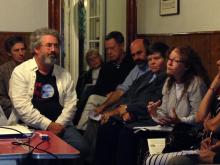
On Oct. 7, Georgia Walker and I appeared before Judge Matt Whitworth in a Jefferson City, Mo., federal court on a charge of criminal trespass to a military facility. The charge was based on our participation in a June 1 rally at Whiteman Airforce Base protesting drone warfare. Walker and I attempted to deliver a loaf of bread and a letter to the base commander, encouraging the commander to stop cooperating with any further usage of unmanned aerial vehicles, (drones) for surveillance and attacks.
The prosecutor, USAF Captain Daniel Saunders, said that if we would plead guilty to the charge, he would seek a punishment of one month in prison and a $500 fine. We told the prosecutor we could accept a “no contest” plea but were not willing to plead guilty. The prosecutor then said he would recommend a three-month prison sentence and a $500 fine. The judge refused to accept a “no contest” plea. We then requested a trial, which has been set for Dec. 10.

AS CHRISTIANS concerned about peace and justice, this time of crisis in the Middle East provides us an opportunity to return to our principles, the “springs of living waters” for people of faith:
- We need to oppose both anti-Semitism as well as any form of discrimination and racism against Palestinian Arabs. Solutions that promote or tolerate discriminatory and racist institutions and practices should be forthrightly condemned. Settlements, illegal under international law and discriminatory against Palestinians, need to be rejected rather than tolerated and legitimized.
- We need to work for justice, which requires that we work for a solution that levels the playing field rather than seek a “realistic” approach that reflects the balance of power between the parties, necessarily favoring the strong against the weak.
- We need to seek reconciliation and peace between the parties, rather than assuming eternal hostility and enmity between the parties.

My people have committed two sins: They have abandoned me, the spring of living waters, and have dug for themselves cisterns, broken cisterns ... that hold no water.
—Jeremiah 2:13
IN THE LATE 1980s and early '90s, Palestinians rose up against the Israeli occupation of Palestinian territories in what became known as the First Intifada. Instead of acceding to the demands for justice by the "children of the stones," the response was a process of talks that led to the signing of the Oslo Accords in 1993.
The “peace process” engaged the leadership of the PLO (Palestine Liberation Organization)—then weak, corrupt, exiled, and with little vision or support—in what turned out to be a worse-than-fruitless effort that led to the perpetuation of the occupation and suffering of the Palestinian people, and which made a just peace even further away.
The process was intriguing to many of us in the peace and justice community, and it successfully co-opted us, as it co-opted the Palestinian leadership, but this process entailed both the abandoning of principled positions and the adoption of the Oslo system, a broken system that could not possibly deliver what it promised.
We were treated to a new language by Israel and the U.S., which seemed at first blush to adopt our own slogans: Where Palestinians were constantly complaining of Israel’s refusal to acknowledge them—its demonization of their leadership, and trying to have Jordan or other local collaborators speak on their behalf—the new process brazenly invited the PLO itself and its leader Yasser Arafat to participate as the “sole legitimate representative of the Palestinian people.”
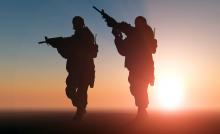
I write this essay on the eve of a US led air campaign that marks “the biggest direct military intervention in Syria since the crisis began more than three years ago.” There is no denying that ISIS/ISIL has captured the attention of the world through its religiously inspired acts of violence. The atrocities committed in recent months by ISIS/ISIL have left countless people of faith—including many devout Muslim leaders across the world—speechless.
Yet, one of the central aspects of religiously inspired violence is that it rails against silence. Whether it is Christian violence in Nigeria and Uganda, Hindu violence in Western India, Jewish violence in Gaza, or Islamic violence in Indonesia and Syria, acts of terror demand denunciation. The ubiquity of religiously inspired violence across cultures and religious traditions lends credibility to the belief of some that religion itself is the problem. My own Christian tradition treats our inclination to harm and even kill one another as symptomatic of our fallen natures; it is a mark of our propensity to evil. This is what makes religious violence so pernicious: it twists our one remedy so that it exacerbates the disease.
Violence—whether it arises out of a Quentin Tarantino film or a YouTube video of decapitation—captures our attention. Even as we are repulsed by the scope of human depravity, such acts of violence consume our attention. Scenes of violence are like a mirror into the darkest parts of our soul: we cannot bear the images we see, but neither can we turn away.
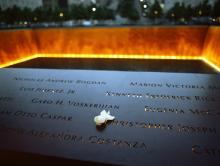
It’s been 14 years since our government declared war on terrorism. How are we doing? It feels like a disastrous game of Whack-A-Terrorist, doesn’t it? We kill one terrorist hiding in one hole, and out pops another one from another hole. Now we are facing the newest threat, a terrorist organization seeking to set up a nation-state, ISIS or IS, as its leadership prefers to be called. The Islamic State, at least, would be a concrete opponent. If they hold on to territory and establish a functioning government, we could at least declare war on a tangible target. Though regrettable it would at least make sense within the logic of war in which states fight other states.
In a recent article for Patheos.com, David French uses Christian Scripture as a justification for “responding to ISIS with wrath and vengeance.” French is a lawyer, a captain in the U.S. Army Reserve and senior counsel at the American Center for Law and Justice. He claims that, according to the Apostle Paul’s letter to the Romans, while individuals are called upon to love their enemies, there is no such call placed on governments. In fact, God has instituted governmental authority in order to execute his wrath against evildoers. And apparently, or so Romans 13 puts it according to French, to know who the evildoers are one simply needs to look at who governments are punishing. French quotes the relevant passage, Romans 13:3-5:
For rulers hold no terror for those who do right, but for those who do wrong. Do you want to be free from fear of the one in authority? Then do what is right and you will be commended. For the one in authority is God’s servant for your good. But if you do wrong, be afraid, for rulers do not bear the sword for no reason. They are God’s servants, agents of wrath to bring punishment on the wrongdoer. [Emphasis added by French.]
French concludes that American Christians should have no difficulty determining the correct response to ISIS. Why? By the fact of determining that justice must be executed against ISIS, our government has determined that their violence is not only an offense against American citizens (he names the beheading victims, journalists James Foley and Steven Sotloff) but against God himself.
French’s analysis strains credulity. Doesn’t he realize that the Romans to whom Paul was writing were themselves victims of government persecution? Does he think that these persecuted Christians felt they were being justly punished? And what about Paul himself, a Roman citizen who was persecuted and executed by the Roman government? Doesn’t French realize that by his own argument, the Roman authorities were executing God’s judgment against Paul? And by his own analysis, French is a captain in a military force that is from its origins a justifiable target for God’s wrath. Why? Because the founding act of the United States was a rebellion against a government, and “whoever resists authority resists what God has appointed, and those who resist will incur judgment.” (Romans 13:2)
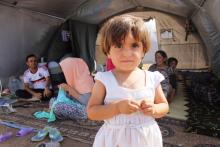
The crisis in Iraq poses two challenges — a humanitarian effort to rescue persecuted minorities, and a security mission to suppress the extremist threat posed by the forces of the Islamic State in Iraq and Syria (ISIS).
The U.S. is right to play a leading role in aiding the Yazidis, Christians, and other threatened minorities in Iraq. The immediate threat against the Yazidis has eased, but minority groups in the region remain endangered by violent extremism. The Obama administration should work through the United Nations to turn this into a genuine international rescue effort. The greater the degree of international participation and support for the aid mission, the more beneficial and legitimate it will be for the recipients.
The U.S. is also right to call attention to the threat posed by ISIS, but we need to do more to mobilize international pressure against the group. The Islamic State is in many respects more dangerous than al Qaeda. It has conquered Mosul and other major cities, taken control of dams and oil facilities, and is steadily expanding its sphere of influence in Syria and Iraq. It has formed a terrorist army with an estimated 10,000 fighters and is now armed with tanks and advanced U.S. weapons stolen from the Iraqi army. The group poses a significant threat to the security of the region and the world.

Alarm and outrage has been growing over the mounting humanitarian crisis in Iraq at the hands of the Islamic State (IS) also known as ISIL (Islamic State of Syria and the Levant) or ISIS (Islamic State of Iraq and Syria).
Christians in the region are being forced to convert, pay tribute or die as the al Qaeda breakaway group sweeps into predominantly Christian villages and Hamlets in Iraq, sending tens of thousands fleeing for their lives. Other non-Muslim groups, in particular the Yazidi, who practice a faith that predates Islam, are reportedly considered as infidels by the fanatic Islamic State and targeted for extermination in what many are calling a genocide. The U.N. is still gathering numbers but it believes that hundreds of Yazidis have been killed while others, primarily women, have been abducted and taken into slavery. Around 40,000 Yazidis have fled into the mountains of Northwest Iraq where they face the prospect of starvation on mountain or massacre by the Islamic State militants below.
The news is devastating and overwhelming. The suffering and acts of brutal violence staggers the imagination. What would a nonviolent response look like?
In response to the death of Michael Brown, many people are using the hastag #IfTheyGunnedMeDown on Twitter to consider the role that images used by the media have on the public's perception of vicitms.
Which picture would the media use #iftheygunnedmedown the left or the right? pic.twitter.com/BXGjJFvRco
— Adam SLANDER (@mr_mookie) August 10, 2014
Here's more according to the Washington Post:
The concern is how media will portray a dead child’s life after he’s slain by police officers. This is the stuff of#IfTheyGunnedMeDown, a Twitter hashtag that trended Sunday as part of the conversation surrounding the death of Michael Brown. Brown, 18, was an unarmed black teenager slain in Ferguson, Mo. He’d recently graduated high school. Black users shared pictures of themselves at their best — in uniforms or caps and gowns — juxtaposed with images that would garner less sympathy and perhaps paint more tawdry pictures of their lives.
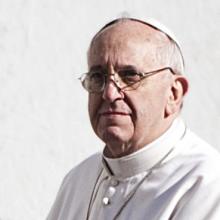
VATICAN CITY — As he dispatches a top aide to war-torn Iraq this week, Pope Francis made his most impassioned plea yet for the world to halt the “slaughter” of Christians and other religious minorities by Islamic extremists.
“The news coming from Iraq leaves us incredulous and appalled,” Francis told pilgrims in St. Peter’s Square on Sunday, as he cataloged the brutal “violence of every kind” that has driven hundreds of thousands of people from their homes and left women and children dead and dying.
“All this seriously offends God and seriously offends humanity,” the pontiff declared. “You cannot bring hatred in the name of God. You cannot make war in the name of God!”
Yet even as Francis called on the international community to find “an efficient political solution that can stop these crimes,” the Vatican also tried to make peace with the idea that U.S. military strikes that began last week were necessary and working.